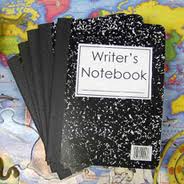Why You Should Keep a Writer's Journal
Biff Barnes
Call it a journal. Call it a diary. Call it a writer’s notebook. Call it what you will. If you are contemplating or working on a major writing project like a memoir or family history you should keep one.

Keeping a writer’s journal fosters creativity. Psychologist Susan Perry in an article in Psychology Today said, “To free your creative self, suggests Janet Burroway in her popular textbook Writing Fiction: A Guide to Narrative Craft, you must give yourself permission to fail.” Said Burroway, "The best place for permission is a private place and for that reason a writer's journal is an essential, likely to be the source of originality, ideas, experimentation, and growth."
There are no rules regarding what a writer’s journal should be. Virginia Woolf put it well when she said, “What sort of diary should I like mine to be? Something looseknit and yet not slovenly, so elastic that it will embrace anything, solemn, slight or beautiful that comes into my mind. I should like it to resemble some deep old desk, or capacious hold-all, in which one flings a mass of odds and ends without looking them through.”
A journal is certainly a memory tool. British novelist W. Somerset Maugham, who eventually published his Writer’s Notebook, observed, "By making a note of something that strikes you, you separate it from the incessant stream of impressions that crowd across the mental eye, and perhaps fix it in your memory.”
But keeping a journal is more than a memory aid. A writer can use one to reflect upon events and gain perspective on the past. Thomas Mann wrote in his Diaries, “I love this process by which each passing day is captured, not only its impressions, but also, at least by suggestion, its intellectual direction and content as well, less for the purpose of rereading and remembering than for taking stock, reviewing, maintaining awareness, achieving perspective.”
We’ll explore why so many of our greatest writers have found journals so valuable and how you might get the most out of one of your own in upcoming posts.